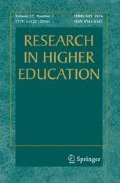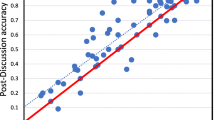Abstract
The present study investigated the effect of three peer monitoring and retest conditions on student quiz scores, attitudes, study time, final course grades, and independent pretest-posttest scores. Three introductory special education classes were randomly assigned to treatments. Students in Group One used a learning partner system similar to one used in a study reported earlier by Fraser, Beaman, and Kelem (1972). Group Two used a system which permitted an unlimited number of retests. The students in Group Three were assigned a combined learning-partner-retest system. All three treatments resulted in significant posttest gains. However, there were highly significant differences in the distribution of course grades. Based on this data it is possible that some behavioral techniques serve more to inflate grades than actually increase overall mastery. Results are discussed in terms of the effectiveness of the learning partners procedure and the implications of this study on the choice of dependent variables for future studies comparing innovative instructional procedures. Several aspects of the data such as study time and student attitudes which tend to contradict results reported earlier by Fraser, Beaman, and Kelem (1972) are documented and discussed.
Similar content being viewed by others
References
Coldeway, D., Santowski, M., O'Brien, R., and Logewski, V. Comparison of small-group contingency management with the personalized system of instruction and the lecture system. In J. A. Johnston,Proceedings of the second national conference on research and technology in college and university teaching. Gainesville, FL: University of Florida, 1975.
Fraser, S. C., Beaman, A. L., and Kelem, R. T. Two Heads are better than one; modification of college performance by peer monitoring. Paper presented at Western Psychological Association Convention, Portland, Oregon, 1972.
Gaynor, J., and Wolking, W. The effectiveness of currently enrolled student proctors in an undergraduate special education course.Journal of Applied Behavior Analysis 1974,7 263–69.
Hammer, M. PSI in a Business Personnel Course. In J. A. Johnston (Ed.),Behavior research and technology in higher education Springfield, IL: Charles C. Thomas, 1975.
Kirk, S. A.Educating exceptional children (2nd ed.). Boston, MA: Houghton Mifflin Co., 1972.
Miller, L. K., Weaver, F. H., and Semb, G. A procedure for maintaining student progress in a personalized university course.Journal of Applied Behavior Analysis 1974,7 87–91.
Rosati, P. A. A comparison of the personalized system of instruction with the lecture method in teaching elementary dynamics. In J. A. Johnston (Ed.),Behavior research and technology in higher education Springfield, IL: Charles C. Thomas, 1975.
Tietenberg, T. H. Teaching intermediate microeconomics using the personalized system of instruction. In J. A. Johnston (Ed.),Behavior research and technology in higher education Springfield, IL: Charles C. Thomas, 1975.
Wodarski, J. S., and Buckholdt, D. Behavioral instruction in college classrooms: A review of methodological procedures. In J. A. Johnston (Ed.),Behavior research and technology in higher education Springfield, IL: Charles C. Thomas, 1975.
Author information
Authors and Affiliations
Rights and permissions
About this article
Cite this article
Barrall, M.E., Axelrod, S. The effects of learning partners and retests on pretest-posttest scores, final course grades, and student attitudes. Res High Educ 8, 177–187 (1978). https://doi.org/10.1007/BF00992118
Issue Date:
DOI: https://doi.org/10.1007/BF00992118



